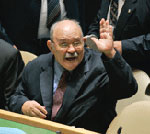NEW YORK -- The United Nations has officially proclaimed 2009 "the International Year of Reconciliation". But whether or not the world will move towards economic stability and political reconciliation -- given the disastrous military conflicts in Iraq and Afghanistan and widespread insurgencies in Africa and Asia against the backdrop of a faltering economic environment -- is a $700 billion bailout question.
The world body is being called upon to grapple with a series of crises-- relating to hunger, poverty, finance, development aid, energy, HIV/AIDS and climate change-- all of them daunting challenges next year.
 |
| Father Brockman |
The outspoken President of the General Assembly, Father Miguel d'Escoto Brockman, a priest and former Foreign Minister of Nicaragua, struck the right political tone when he said last month: "The world is in even more serious trouble than it was 63 years ago when the United Nations was founded."
More than half the world's people -- in a global population of six billion -- languish in hunger and poverty while more money is spent on weapons (over $1 trillion), wars and luxuries, he complained. All of the world's problems are man-made and all of them can be traced in large part to the lack of democracy at the United Nations, he argued.
And Father d'Escoto Brockman rightly pointed out: "A small group of states takes decisions based on selfish motives, and the world's poor are the ones who suffer the consequences."
The wishes of 95 percent of the UN's membership -- as reflected in the 192-member General Assembly -- are of little or no consequence compared to the decisions made by the 15-member Security Council dominated by just five veto-wielding powers: the US, Britain, France, China and Russia.
Still, an attempt to reverse this by bringing about radical changes in the composition and decision-making process of the Security Council, has met with abject failure over the last 20 years. The current attempt may be another good try in a lost cause -- primarily because those who now wield veto powers just do not want to share that privilege with others (specifically Japan, Germany, India and Brazil unsuccessfully knocking at the Council door).
When Iranian President Mahmoud Ahmadinejad addressed the General Assembly last month, he underlined the inequitable power structure at the UN. Iraq is attacked under the false pretext of uncovering weapons of mass destruction (WMDs) and overthrowing a dictator, he said. The dictator is toppled and WMDs are not uncovered. Meanwhile a democratic government is established by the people, but after six years, the military occupiers are still there.
In Afghanistan, a puppet regime in Kabul is being kept alive by military forces from the US and the North Atlantic Treaty Organisation (NATO). The production of narcotics has multiplied and civilians are being killed on a daily basis. But still, the United Nations is incapable of solving any of problems relating to aggression, occupation and imposition.
And the Security Council, described as the most powerful body at the UN, cannot do anything about it either, said Ahmadinejad, "because NATO members also happen to be the major decision makers in the Security Council."
Robert Mugabe, the president of Zimbabwe who has come under heavy fire in the Western news media, also took the opportunity to lash out at the UN when he addressed the General Assembly last month.
A former guerrilla fighter who is accused of running an authoritarian government currently under siege, Mugabe used the UN platform to attack the US, Britain and France for their attempts to impose sanctions on Zimbabwe.
All three veto wielding members tried to invoke chapter VII of the UN charter to hit Mugabe with mandatory sanctions on the ground that his regime was "a threat to peace and international security." That attempt, however, was thwarted by a double veto from Russia and China several months ago, both of whom argued that a domestic crisis does not justify chapter VII sanctions.
"What insanity is this that has afflicted some world leaders? Should the sacred document, the UN charter, be allowed to suffer such undeserved emasculation and disgraceful abuse?"
And where is the protection of the small and innocent countries like mine, Mugabe asked, when threatened by real acts of aggression and punitive acts, often based on completely false allegations and violations of the rule of law, democracy and human rights?
In an implicit attack on the US, Britain and France for their "military atrocities" in Iraq and Afghanistan, Mugabe said: "By the way, those who falsely accuse us of these violations are themselves international perpetrators of genocide, acts of aggression and mass destruction."
Mugabe may not have a pair of clean hands, but his accusing finger was pointed at the right direction. | 
